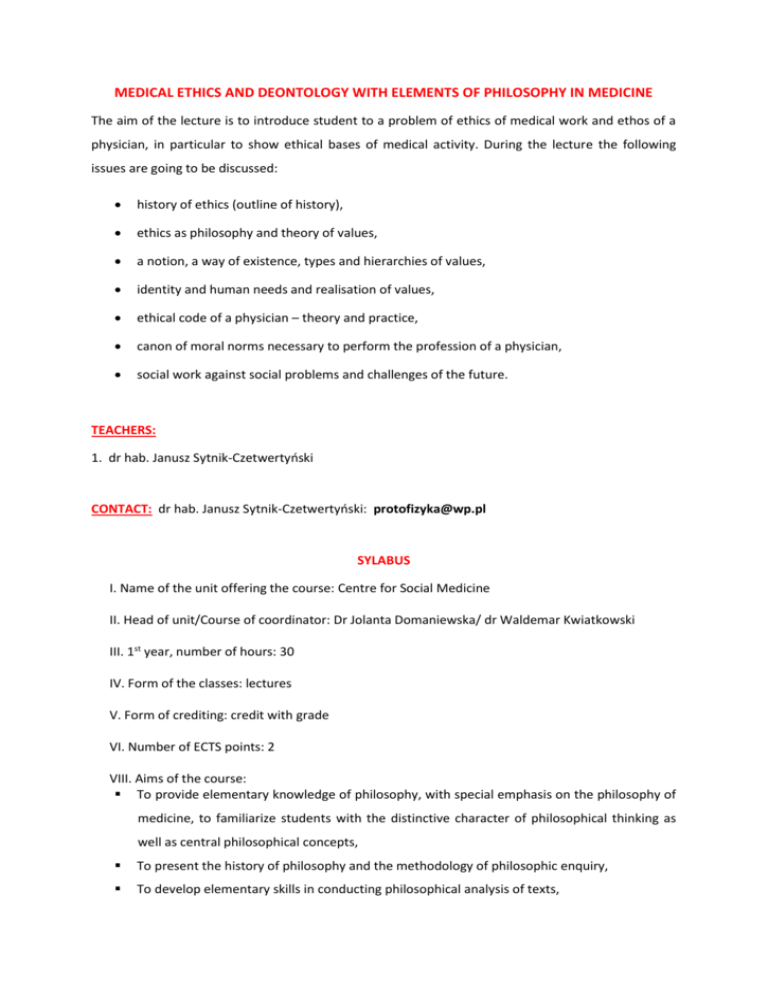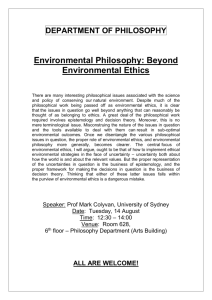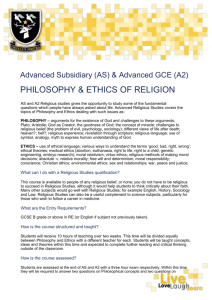Medical Ethics and Deontology with Elements of Philosophy in
advertisement

MEDICAL ETHICS AND DEONTOLOGY WITH ELEMENTS OF PHILOSOPHY IN MEDICINE The aim of the lecture is to introduce student to a problem of ethics of medical work and ethos of a physician, in particular to show ethical bases of medical activity. During the lecture the following issues are going to be discussed: history of ethics (outline of history), ethics as philosophy and theory of values, a notion, a way of existence, types and hierarchies of values, identity and human needs and realisation of values, ethical code of a physician – theory and practice, canon of moral norms necessary to perform the profession of a physician, social work against social problems and challenges of the future. TEACHERS: 1. dr hab. Janusz Sytnik-Czetwertyński CONTACT: dr hab. Janusz Sytnik-Czetwertyński: protofizyka@wp.pl SYLABUS I. Name of the unit offering the course: Centre for Social Medicine II. Head of unit/Course of coordinator: Dr Jolanta Domaniewska/ dr Waldemar Kwiatkowski III. 1st year, number of hours: 30 IV. Form of the classes: lectures V. Form of crediting: credit with grade VI. Number of ECTS points: 2 VIII. Aims of the course: To provide elementary knowledge of philosophy, with special emphasis on the philosophy of medicine, to familiarize students with the distinctive character of philosophical thinking as well as central philosophical concepts, To present the history of philosophy and the methodology of philosophic enquiry, To develop elementary skills in conducting philosophical analysis of texts, To define the philosophical sources (with particular attention to anthropological premises) of medical ethics, To indicate the place of the philosophy of medicine in the system of philosophical thought To present elementary questions in ethics and medical deontology, To present anthropology and philosophy of man, ethical problems and moral dilemmas, To develop moral sensitivity and the capacity for right reaction and correct evaluation of ethical problems, especially with respect to medicine, Decision-making when moral dilemmas occur. IX. Lecture topics: Sources of philosophical thought: the Era of the Seven Sages and the first ethical systems. The emergence of scientific solutions in philosophical debate. Materialist and idealist conceptions, Sources for the philosophy of man, Socratic and Sophistic conceptions, The mind-body problem and the duality of human nature, anthropological conceptions of the problem of the body as subject to social restrictions, Ethical problems, the emergence of moral systems and their sources. The norm and ethical judgement, the influence of Enlightenment ethics on the formation of deontological codes. Ethical problems. The nature of specific conceptions and their solutions. The dilemmas of modern philosophy of medicine, Philosophy and medicine. Summary of issues addressed during the course. Modern developments and doctrines in ethics. The origin and branches of ethics. Ethics and morality. The notion of good and truth in ethics. The nature of ethics (realism, intuitionism, naturalism, relativism, subjectivism). The structure of moral judgement – value, norm, duty, sanction. Ethical dilemmas. Moral vs. professional values. The moral dilemmas of today. Freedom as a value, equality as a value, justice as a value, tolerance as a value, dignity as a value, peace as a value. Elements of environmental ethics, selected aspects of various types of environmental ethics. Postmodern philosophy. Ethical problems, the emergence of moral systems and their sources. The norm and ethical judgement, the influence of Enlightenment ethics on the formation of deontological codes. Ethical problems. The nature of specific conceptions and their solutions. The dilemmas of modern philosophy of medicine. X. Course material to be assimilated by the student independently: I. Students are to expand their elementary knowledge of philosophy with respect to the subject area of the course. XI. Reading material: Basic texts: Haeffner G., Wprowadzenie do antropologii filozoficznej, Kraków 2006 MacIntyre., Krótka historia etyki, Warszawa 1995. Russell B., A History of Western Philosophy and Its Connection with Political and Social Circumstances from the Earliest Times to the Present Day. New York: Simon and Schuster, 1972 Illich I. Limits to Medicine: Medical Nemesis: the Expropriation of Health: with a new introduction by the author. London: Boyars, 1995 R. Gillon, Etyka lekarska – problemy filozoficzne. T.L. Beauchamp, J.F. Childress, Zasady etyki medycznej, KiW, Warszawa, 1996. P. Ramsey, Pacjent jest osobą, PAX, Warszawa 1977. B. Mepham Bioetyka. Wprowadzenie dla studentów nauk biologicznych, Wydawnictwo Naukowe PWN, Warszawa, 2008. Blackburn S. Think: a Compelling Introduction to Philosophy. Oxford: Oxford Additional: University Press, 2001. Selby-Bigge LA, Nidditch PH, Hume D. Enquiries Concerning the Human Understanding and Concerning the Principles of Morals, 3rd edn. Oxford: Clarendon Press, 1975. Simpson LC. The Unfinished Project: Towards a Postmetaphysical Humanism, 3rd edn. London: Routledge, 2001. XII. Practical skills and their verification: The ability to formulate and to resolve philosophical and ethical problems in a basic measure. The passing of the course is conditional on the timely submission of a written paper and its oral defence. RULES AND REGULATIONS I. Criteria for passing the course. In order to pass students will have to hand in – on time – a problem paper to be defended orally. II. Criteria for passing tutorials III. Criteria for passing the colloquium IV. Exam criteria As indicated above. V. Making up for justified absences or classes not passed for other reasons Colloquium on the subject matter treated during the course. VI. Deadlines for papers, reports or other types of written documents required by the unit. VII. General and detailed safety regulations applicable during teaching at the unit. General safety regulations apply during courses.







